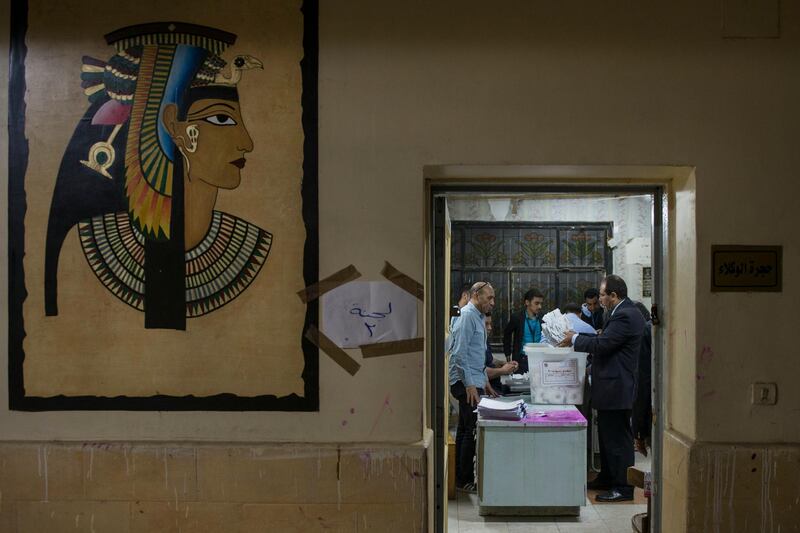Egypt’s voters have handed Abdel Fattah El Sisi an overwhelming victory, but with a lower turnout that the president had called for in seeking endorsement for a second term.
The former army field marshal and military intelligence chief garnered as much as 90 per cent of the vote, according to initial counts reported by the state-run Middle East News Agency, with a turnout of about 24 million voters - about 40 per cent of the electorate.
Voters who cast their ballots for Mr El Sisi this week spoke of their support for his efforts to improve security, launching of large and long-delayed infrastructure projects, and taking brave steps to re-direct a lagging economy. But Mr El Sisi's failure to improve on the 47.5 per cent turnout of the 2014 election could be attributed to apathy among Egyptians under 30 - the country's biggest demographic - who often speak about lack of progress on education, healthcare and job creation.
Young critics say they do not believe the older generation running the country know how to create private sector jobs or jump-start needed reforms in education. The president's heavy-handed governing style constrains the ability of Egyptians in their twenties and thirties to contribute meaningfully to the country's development, they say.
"They are launching these projects with large investments assuming that it will solve the unemployment crisis and attract investments," said Mohamed Zaky El Karany, 25, a youth leader in the Social Democratic Party. "But this is not the development that people need; education and health care should be the first step to raise our human capital."
These issues primarily affect Egyptians under 30, who make up two-thirds of the country's 90 million population, said Mr El Karany.
Although Mr El Sisi's prime minister, Sherif Ismail, has said the 2018-19 budget will allocate more to education, health and social welfare and protection programmes, it is widely acknowledged that actual spending in these areas lag behind the government's targets and those set in the constitution.
Despite a growing population, the proportion of the state budget allocated for education declined from 11.9 per cent in 2004 to 7.4 per cent in 2017.
"Thirty-five per cent of Egyptian children in school do not know how to read or write, so the public-school system is failing to prepare students for either university education or vocational training," said Adel Abdel Ghafar, an Egyptian researcher at the Brookings Institution think tank. "Poor education is disadvantaging them for life."
In a pre-election interview, Mr El Sisi himself complained that "real education" had been lacking in Egypt for more than 30 years.
"An educational reform programme takes 14 years to implement," the president said.
He said he would work with global partners to improve the higher education system.
"All new universities will form partnerships with the world's top 50 universities and that will result in modifying the curricula and teaching methods appropriately," the president said.
No Egyptian institution made the Times Higher Education ranking of the top five universities in the Arab world, published one week before the elections.
The shortfall for social investment extends to Egypt's healthcare system. Medical insurance is out of reach for 25 million citizens who cannot afford the monthly premiums.
"The government currently allocates only 8 billion pounds [Dh1.66bn] for the health system," said Deputy Health Minister Ali Hagazi. "The new insurance system [drafted in February] will require 120bn pounds annually."
Prime Minister Ismail's 2018-19 budget allocates 322bn pounds to social welfare and protection programmes, with more than two thirds intended for cash handouts and food subsidies for the poorest Egyptians.
Observers question how the government can simultaneously improve the quality of education, fund a new medical insurance scheme and complete construction of its showcase mega-projects, which include a city built from scratch on the site of the Second World War battlefield at Al Alamein and a US$45bn (Dh165bn) new capital in the desert 40 kilometres east of Cairo.
Mustafa Kamal, 26, an assistant researcher at Cairo's Al Ahram Centre for Political and Strategic Studies, said hitting the 3 per cent of GDP spending targets for education and health care would be difficult for the government. By comparison about 20.5 per cent of the UAE's 2017 budget was earmarked for education, and 8.6 per cent for health care.
"The health insurance law has not been implemented yet despite the approval of the Egyptian parliament," Mr Kamal said, "and the education ministry is late in delivering the comprehensive strategy that President El Sisi has asked for."
The president has made clear that there are limits on what he can do to address these issues, even with a centralised power structure.
"Citizens have to take some of the responsibility," Mr El Sisi said. "Couples who choose to have up to five children without first having a plan for how to provide for them should take more care in thinking about the future."
His supporters say the president is doing the best he can given the security and economic challenges he inherited.
“The next four years do represent a real challenge for Egypt,” said Michael Mamadouh, 20, a business major at Ain Shams University. “The president is not responsible alone for the development of the country. The people are also responsible for this. We need all of us to work together for the benefit of our country.”





